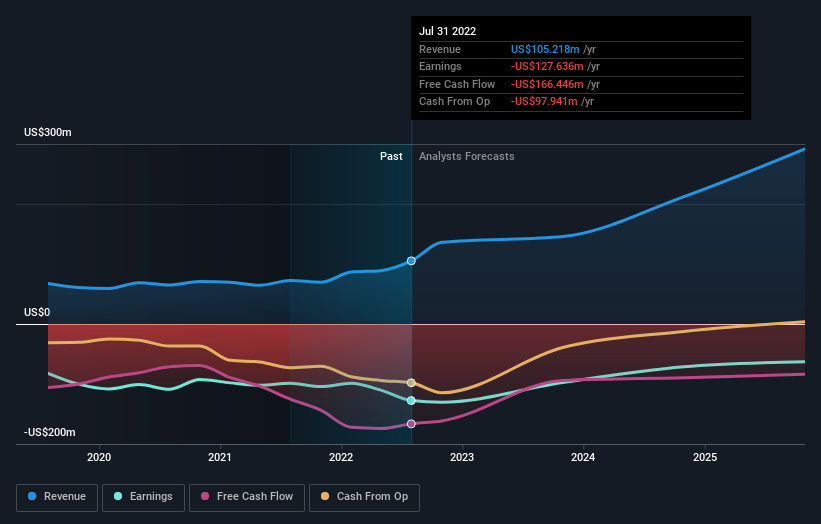- United States
- /
- Electrical
- /
- NasdaqGM:FCEL
FuelCell Energy, Inc.'s (NASDAQ:FCEL) market cap touched US$1.5b last week, benefiting both individual investors who own 56% as well as institutions

If you want to know who really controls FuelCell Energy, Inc. (NASDAQ:FCEL), then you'll have to look at the makeup of its share registry. And the group that holds the biggest piece of the pie are individual investors with 56% ownership. That is, the group stands to benefit the most if the stock rises (or lose the most if there is a downturn).
While individual investors were the group that reaped the most benefits after last week’s 17% price gain, institutions also received a 44% cut.
Let's delve deeper into each type of owner of FuelCell Energy, beginning with the chart below.
View our latest analysis for FuelCell Energy

What Does The Institutional Ownership Tell Us About FuelCell Energy?
Many institutions measure their performance against an index that approximates the local market. So they usually pay more attention to companies that are included in major indices.
As you can see, institutional investors have a fair amount of stake in FuelCell Energy. This can indicate that the company has a certain degree of credibility in the investment community. However, it is best to be wary of relying on the supposed validation that comes with institutional investors. They too, get it wrong sometimes. It is not uncommon to see a big share price drop if two large institutional investors try to sell out of a stock at the same time. So it is worth checking the past earnings trajectory of FuelCell Energy, (below). Of course, keep in mind that there are other factors to consider, too.

FuelCell Energy is not owned by hedge funds. Our data shows that BlackRock, Inc. is the largest shareholder with 9.5% of shares outstanding. In comparison, the second and third largest shareholders hold about 8.0% and 2.6% of the stock.
On studying our ownership data, we found that 25 of the top shareholders collectively own less than 50% of the share register, implying that no single individual has a majority interest.
Researching institutional ownership is a good way to gauge and filter a stock's expected performance. The same can be achieved by studying analyst sentiments. Quite a few analysts cover the stock, so you could look into forecast growth quite easily.
Insider Ownership Of FuelCell Energy
The definition of an insider can differ slightly between different countries, but members of the board of directors always count. Management ultimately answers to the board. However, it is not uncommon for managers to be executive board members, especially if they are a founder or the CEO.
Insider ownership is positive when it signals leadership are thinking like the true owners of the company. However, high insider ownership can also give immense power to a small group within the company. This can be negative in some circumstances.
Our most recent data indicates that insiders own less than 1% of FuelCell Energy, Inc.. It is a pretty big company, so it would be possible for board members to own a meaningful interest in the company, without owning much of a proportional interest. In this case, they own around US$2.5m worth of shares (at current prices). It is good to see board members owning shares, but it might be worth checking if those insiders have been buying.
General Public Ownership
The general public -- including retail investors -- own 56% of FuelCell Energy. With this amount of ownership, retail investors can collectively play a role in decisions that affect shareholder returns, such as dividend policies and the appointment of directors. They can also exercise the power to vote on acquisitions or mergers that may not improve profitability.
Next Steps:
While it is well worth considering the different groups that own a company, there are other factors that are even more important. To that end, you should be aware of the 3 warning signs we've spotted with FuelCell Energy .
If you are like me, you may want to think about whether this company will grow or shrink. Luckily, you can check this free report showing analyst forecasts for its future.
NB: Figures in this article are calculated using data from the last twelve months, which refer to the 12-month period ending on the last date of the month the financial statement is dated. This may not be consistent with full year annual report figures.
New: AI Stock Screener & Alerts
Our new AI Stock Screener scans the market every day to uncover opportunities.
• Dividend Powerhouses (3%+ Yield)
• Undervalued Small Caps with Insider Buying
• High growth Tech and AI Companies
Or build your own from over 50 metrics.
Have feedback on this article? Concerned about the content? Get in touch with us directly. Alternatively, email editorial-team (at) simplywallst.com.
This article by Simply Wall St is general in nature. We provide commentary based on historical data and analyst forecasts only using an unbiased methodology and our articles are not intended to be financial advice. It does not constitute a recommendation to buy or sell any stock, and does not take account of your objectives, or your financial situation. We aim to bring you long-term focused analysis driven by fundamental data. Note that our analysis may not factor in the latest price-sensitive company announcements or qualitative material. Simply Wall St has no position in any stocks mentioned.
About NasdaqGM:FCEL
FuelCell Energy
Manufactures and sells stationary fuel cell and electrolysis platforms that decarbonize power and produce hydrogen.
Flawless balance sheet low.


